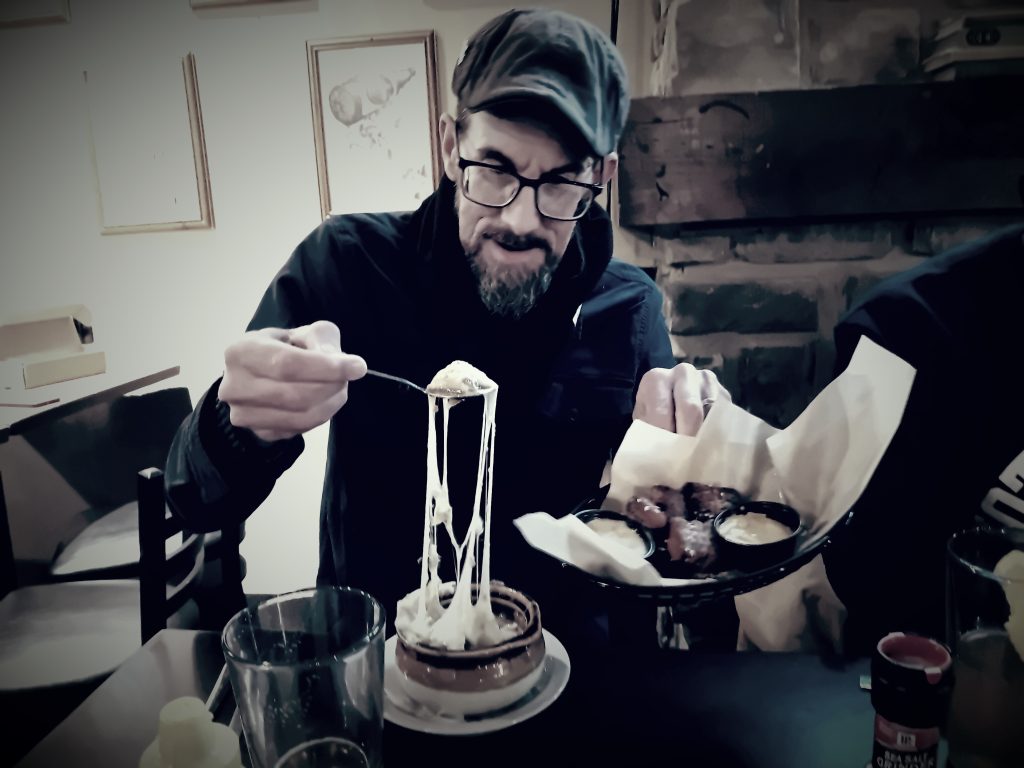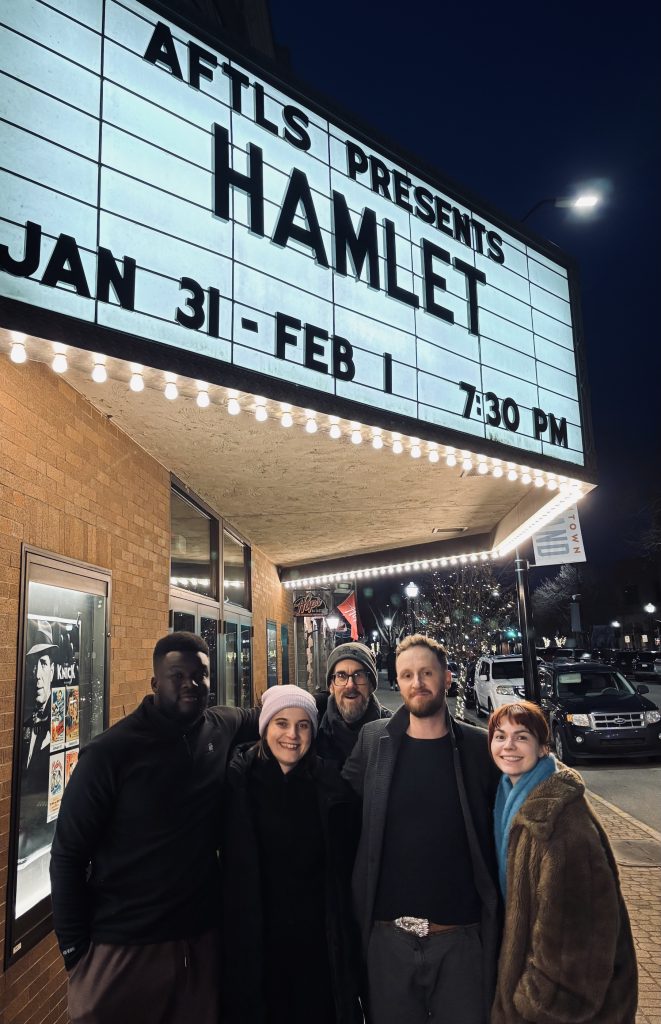By Michael Wagg
True hope is swift
Here we go. Ahead of us are ten US cities, across eight states, in three time zones. A play written 425 years ago which may be the most famed of them all; 26 characters, just five actors to inhabit them. A company with 50 years’ history, making and touring almost 80 full productions of Shakespeare plays, alongside classroom residencies for thousands of students since 1975. And now it’s our turn: we are Esmonde, Jack, Joanna, Sadie and Waggy, raising our bats for a half century.
The weight of all this, the hope itself, could feel immense. Added to which are all those Hamlets behind us, all those Ophelias, Horatios, Osrics and Yoricks, hanging round our necks whispering ‘remember me.’ But with Shakespeare as some sort of engine, here at Hope College in the thaw, what I think we feel at the outset is the opposite: lightness, swiftness. A murmuration in blank verse. The readiness is all.
Someone stop me, before I lose myself in a vortex of theatrical-ornithological nostalgia. There’ll be plenty more of that along the way, by the way! And incidentally, starlings exist in the US thanks to their mention in Shakespeare’s Henry IV. But what are we actually doing here?
Well, we’ve rehearsed our production of Hamlet for five weeks at the Karibu Centre in Brixton, London, followed by a week consolidating the work – while opening bank accounts, getting social security numbers and slurping French onion soup – on the campus of our home base at the University of Notre Dame, South Bend, Indiana. What Homer ‘Murph’ Swander and Captain Jean Luc Picard set in motion, among others, 50 years ago is stronger than ever and still true to its original aim: Shakespeare, front and centre.
We are a five-strong company of actors who have made our show with no single director, designer, composer or stage management. The stuff of our production, like all of those before us, fits into one suitcase and it can be played anywhere, with no depending on set or costuming and with very little stage tech. Though we do have a few tricks up our collective sleeve. Our motto from the off has been ‘for the good of the play.’
We’ve already previewed to a focused audience at the Westville Correctional Facility in Indiana, and this week opened the show proper at the Knickerbocker Theater in downtown Holland, Michigan. Which is a lovely town by the way, full of breweries and tulips, somewhere under the ice.
As always, we’ve also spent the week working across campus with students of all disciplines at this handsome Liberal Arts College on the east shore of Lake Michigan. It’s been a relatively light week so we’ve been lowered gently into the plunge pool of learning. I led a workshop for Creative Writing majors coming to the business end of their course and then one for Acting students on Waiting For Godot. Sadie and Joanna led sessions with Psychologists exploring sleep and global child rights.
Meanwhile Esmonde ran a workshop on improvisation, while Jack was thrust into the locker room to work with the men’s lacrosse team on dealing with ‘trash talk.’ Shakespeare’s dynamic, juicy insults are never not needed, and if ever there was an example of how this work works – where something of Shakespeare meets, head on, something of the world – Jack’s raucous, brilliant session was it. As they say at the Sport, or at the original Globe for that matter: scenes!
Our first shows, at the glorious Art Nouveau Knickerbocker and at the Muskegon Correctional Facility, were warmly received – the prison performance in particular, a forceful reminder of the concrete value of this work. Research shows that by committing to this four-year degree program, of which our performance was part, our audience are reducing their chances of reoffending by 75%. One student thanked us afterwards ‘for taking me out of here for two hours.’
The shows have bolstered us to continue to refine and reinvent our telling of this soul-searching story. Particularly after Sadie overheard a potential audience member outside the theatre asking ‘What the f*#k is Hamlet?!’ It’s a good question and we hope the answer lies on the road ahead; but since brevity is the soul of wit – something I ought to know by now and have spectacularly failed to achieve in this first missive – I’ll share more about the show in the coming weeks and dive into some of the history of this singular company, AFTLS & Shakespeare at Notre Dame.
To call it a company is right, but it’s far more than that: it’s a life-long project, certainly a way of life for us five hopefuls for the next ten weeks; it’s a labour of many, many loves, and a creative commitment to share Shakespeare’s words, not on the page, but in the air between us.



